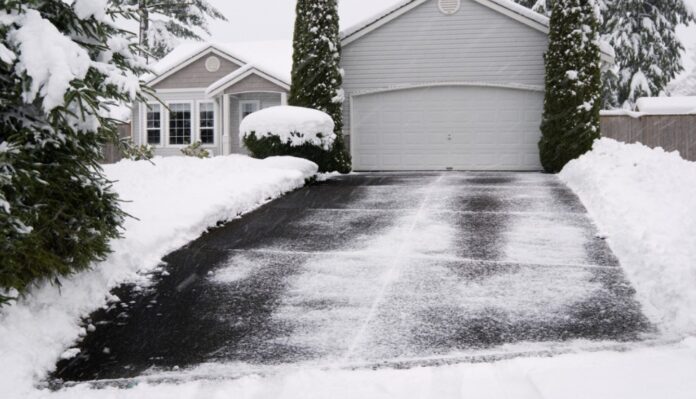Winter weather can cause a great deal of damage to outdoor concrete surfaces, including driveways. From cracking and pitting caused by freezing temperatures to staining due to rock salt, it’s important to take steps in order to protect your driveway this winter. Some of the best tips for preventing winter-related damage include:
Making use of sealant treatments
Winter is a harsh season for driveways; the salt, snow, and ice can take a toll on concrete or asphalt. One of the most effective ways to protect against winter damage is to use a sealant treatment. This type of coating creates a sturdy shell that is resistant to moisture, light, and UV rays. It also makes it more difficult for de-icing agents such as salt or sand to penetrate the driveway surface.
Added bonuses include better protection from oil and gas spills along with improved slip resistance in wet conditions. Sealant treatments require some maintenance but they are well worth it if you want to keep your driveway looking its best all year long!
Cleaning up any debris that is left on the pavement
Keeping your driveway clear of debris in the winter can be a very important part of protecting it from damage. The harsh winter elements can freeze any kind of surface dirt and debris, causing them to stick like glue to your driveway and be much harder to clean later on.
Taking a few minutes every week during particularly harsh winter months to sweep away leaves and pine needles or blow off heavier accumulations like snow or ice can help your driveway remain clean while also avoiding hazardous spots such as icy patches caused by melting into previous frozen organic matter.
Furthermore, it is wise to clear out any muck that can become stuck onto the crevices between stones or other sections of your installation; it is worth taking the time to powerwash or hand-scrub those areas once in a while so that winter does not surprise you with a struggle for removal when spring comes around!
Repairing imperfections before they worsen
Protecting your asphalt driveway from winter damage is key to its longevity. Fortunately, there are asphalt services designed to help. These services can repair small and large imperfections before they worsen and result in costly repairs. As simple as patching potholes or filling cracks, these asphalt services can reduce the risk of long-term damage caused by freezing temperatures and snowfall.
Monitoring the temperature so that no water freezes beneath the surface
Winter can cause significant damage to driveways if the temperature is not monitored carefully. By monitoring the temperature correctly, you can ensure that no water in or beneath the surface of your driveway freezes. This small maintenance step eliminates any risk of cracking and ensures long-term structural integrity.
Potholes develop as a result of continual freezing and thawing, which leads to surface erosion and costly repairs down the road. While asphalt driveways typically suffer more in cold weather than concrete driveways, all materials are at some risk during winter months if proper precautions aren’t taken. Monitoring the temperature around your driveway helps prevent further damage from occurring while reducing repair costs.
Keeping away snowplows and sanding equipment while clearing snow
To maintain a clean, safe driveway throughout the winter months, it’s essential to keep snow plows and sanding equipment away from the surface. Shovels or plastic tools can be used to clear snow rather than abrasive steering and scraping tools, as these can damage the finish of a driveway and create potential hazards when ice begins to form.
Before using any de-icing chemical on your driveway, be sure to pay attention to product labels—many products can not only create environmental damage but could also cause further wear or break down seal coating applications on your surface. Keeping snowplows away from your surface this winter is an essential step that will help you protect your driveways for years to come.
Using a deicer sparingly
One of the most important ways to protect your driveway from winter damage is to use a deicer sparingly in order to avoid weakening the pavement itself and its protective sealant. When it comes time to battle the cold and snow, opt for sand or gravel instead of deicing chemicals.
If you must use a chemical deicer, use one with a low concentration of sodium chloride and look for one that contains an anti-corrosion agent that helps limit corrosion damage to metal objects within 25 feet of where it’s applied. Improper usage of chemical deicers can have long-term harmful effects on asphalt driveways in particular, so if you’re going to use a deicer, be sure to read all instructions on the product label carefully before you apply it.
Taking these essential preventative measures will help keep your driveway in peak condition throughout even the coldest winter months.






